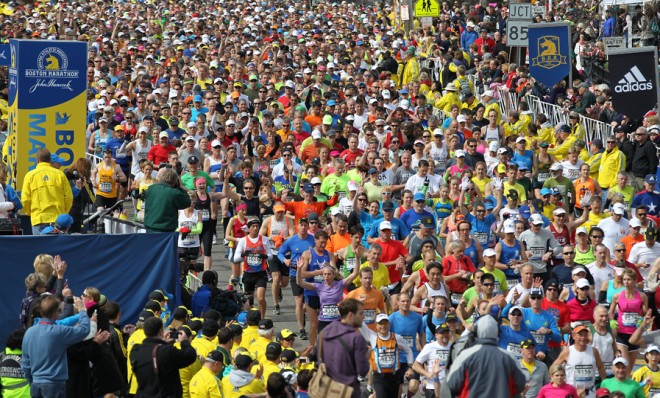Why it's nearly impossible to have airtight security at marathons
How do you monitor every single person and object along a 26.2-mile course?

A free daily email with the biggest news stories of the day – and the best features from TheWeek.com
You are now subscribed
Your newsletter sign-up was successful
In the wake of the deadly bombings that devastated Boston and terrified America on Monday, this may be a tough reality to swallow. But it's true nonetheless: Implementing airtight security on a 26.2-mile marathon course is nearly impossible.
Unlike stadium sporting events, which are by their very nature contained, access control poses an enormous security challenge at marathons. The Boston Marathon winds through 26.2 miles of suburbs as well as densely populated blocks downtown, and no gate with security personnel and metal detectors runs the length of the roadway. A half million people come and go as they please, lining the streets and filling large grandstands at the finish line.
This come-and-go atmosphere presents another problem unique to marathons — contact between athletes and spectators. Fans along the route hand out orange slices to runners and kids offer enthusiastic high-fives. Free-flowing access is part of the marathon culture.
The Week
Escape your echo chamber. Get the facts behind the news, plus analysis from multiple perspectives.

Sign up for The Week's Free Newsletters
From our morning news briefing to a weekly Good News Newsletter, get the best of The Week delivered directly to your inbox.
From our morning news briefing to a weekly Good News Newsletter, get the best of The Week delivered directly to your inbox.
"I've lost sleep over the fact that you have 52 miles of open roadway, 26 on each side," Guy Morse, who served as Boston Marathon race director from 1985-2000 and BAA executive director from 2000-2010, tells Boston.com. "That's the way I looked at it. You look at both sides of the road, as well as the course itself. It is impossible to secure it to the extent necessary. So, it has significant ramifications for major events."
Still, by all accounts, security in Boston on Monday was tight: Fire, emergency management, law enforcement, and race organizers met multiple times before the race to hammer out plans, form incident-response teams, and drill for emergencies. Police, safety officials, and bomb-sniffing dogs all inspected the roadway before the race.
And yet, the bomber (or bombers) succeeded.
London, which will host 37,000 marathoners this Sunday, is already on alert for copycats, reviewing security plans and keeping in close contact with runners, emailing them updates as the race approaches. This morning, Hugh Robertson, the British government's sports minister, sounded confident on BBC radio, saying he's "absolutely confident we can keep the London Marathon safe and secure." Let's hope so.
A free daily email with the biggest news stories of the day – and the best features from TheWeek.com
Carmel Lobello is the business editor at TheWeek.com. Previously, she was an editor at DeathandTaxesMag.com.
-
 Bonfire of the Murdochs: an ‘utterly gripping’ book
Bonfire of the Murdochs: an ‘utterly gripping’ bookThe Week Recommends Gabriel Sherman examines Rupert Murdoch’s ‘war of succession’ over his media empire
-
 Gwen John: Strange Beauties – a ‘superb’ retrospective
Gwen John: Strange Beauties – a ‘superb’ retrospectiveThe Week Recommends ‘Daunting’ show at the National Museum Cardiff plunges viewers into the Welsh artist’s ‘spiritual, austere existence’
-
 Should the EU and UK join Trump’s board of peace?
Should the EU and UK join Trump’s board of peace?Today's Big Question After rushing to praise the initiative European leaders are now alarmed